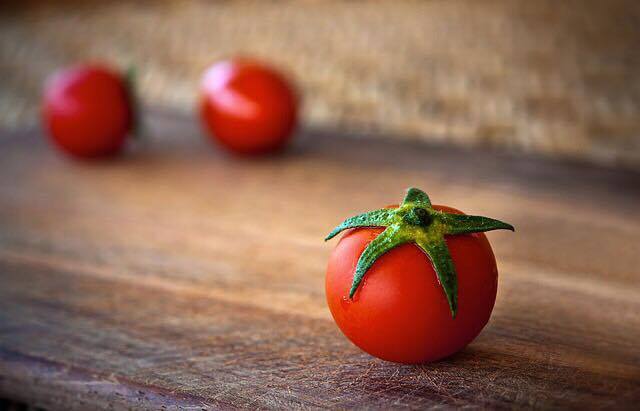Tomatoes are one of the better-known types of produce to be enjoyed as part of a side salad or in your sandwich. There are many health benefits to this vegetable (which is technically a fruit) including being a good source of vitamin C, K, fibre and a good source of lycopene.
Lycopene is a type of antioxidant; an antioxidant is a plant compound which helps to remove excess free radicals. Free radicals in excess can cause damage and disease to the cells of your body. Excess free radicals can lead to chronic diseases such as heart disease, type two diabetes, and certain cancers such as prostate cancer. Lycopene may also improve the health of your skin.
The positive effects of lycopene on heart health and in particular your cholesterol levels are less well known. A study investigated the potential effects of tomato on your cholesterol levels.
It was found that eating three hungered grams of tomatoes daily or the equivalent of equal or greater than twenty-five milligrams a day for two weeks reduced the low-density lipoproteins cholesterol levels of the participants by a huge ten percent! LDL or low-density lipoproteins cholesterol is a type of cholesterol which in excess amounts begins to build up the arteries of your body to form plaques. This is what can lead to a heart attack.
The reasoning behind this effect from the researchers were proposed to be the anti-atherosclerotic properties or the properties which reduce the build-up plaques in your arteries. Also, the lipid peroxidation effects or the process of using oxygen to remove the fat molecules.
Eating three hundred grams of fresh tomatoes daily is quite a lot of tomatoes. Good news is there are forms of tomato which provide a higher level of lycopene. For example, tomato paste contains six times more lycopene in a quarter cup than a fresh tomato per one hundred grams. Half a cup of tomato sauce contains over five times the number of fresh tomatoes per one hundred gram serving.
If you are not a fan of tomatoes, there are other food sources of lycopene which are higher than fresh tomatoes. This includes guava which contain one point seven times the amount of lycopene per one hundred grams of fresh tomatoes. Also, watermelon which has one point five times the amount of lycopene per one hundred grams compared to fresh tomato.
Some ideas on ways to enjoy tomato and give yourself a healthy dose of lycopene is through soup. Having a soup in your desk draw at work can be a smart way to have a health promoting snack close at hand rather than opting for the muffin in the kitchen. Soups can also be a savvy way to have a sauce ready for your next pasta meal or to use as a base to a sauce to add more ingredients too.
You can enhance the amount of lycopene in your soup further by enjoying a side slice of toasted bread with some cream cheese and tomato, or a cheese and tomato sandwich.
A tasty way to enjoy guava is by making guava paste and adding to a cracker with some cheese. Having a refreshing juice is another idea. Watermelon and guava make delicious juices by themselves of combined.
Take home message: There is no one magical food which is the key to overall health and longevity. Enjoying a variety of fruits and vegetables is the best strategy to promote overall health including the health of your heart. Each fruit and vegetable have different nutrients and antioxidants which protect the health of your body in different ways. As part of an overall varied and balanced diet to support the health of your heart trying to add lycopene rich source of produce is a smart move .
If you are seeking client centred, individualised nutrition support to help optimise your overall health including the health of your heart reach out to Feed Your Future Dietetics today!
References:
1. Cheng HM, Koutsidis G, Lodge JK, Ashor A, Siervo M, Lara J. Tomato and lycopene supplementation and cardiovascular risk factors: A systematic review and meta-analysis. Atherosclerosis. 2017 Feb;257:100-108. doi: 10.1016/j.atherosclerosis.2017.01.009. Epub
2. Top 10 Foods Highest in Lycopene. My Food Data https://www.myfooddata.com/articles/high-lycopene-foods.php
3. LDL: The ‘Bad’ Cholesterol. National Library of Medicin. https://medlineplus.gov/ldlthebadcholesterol.html








